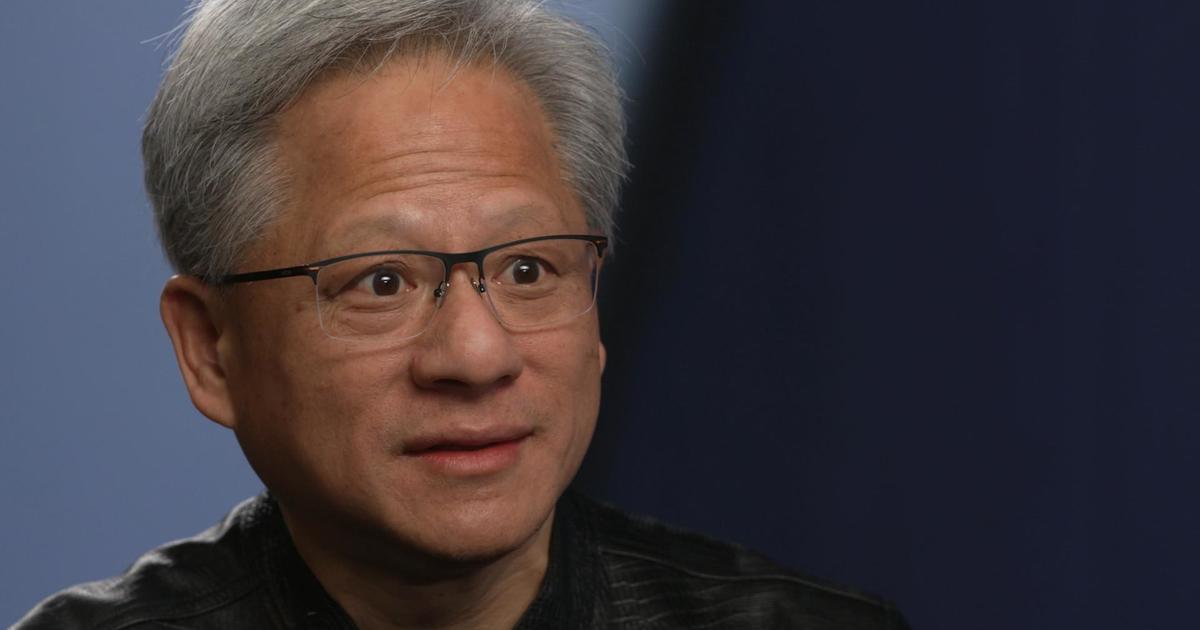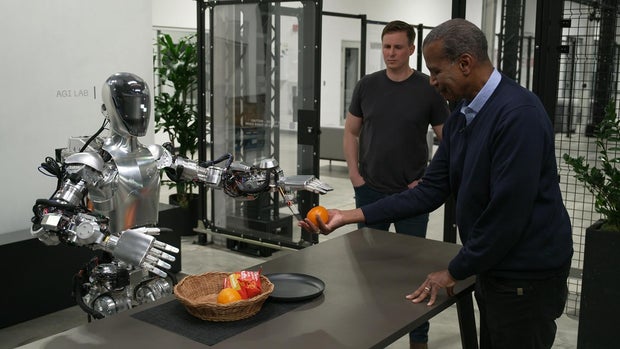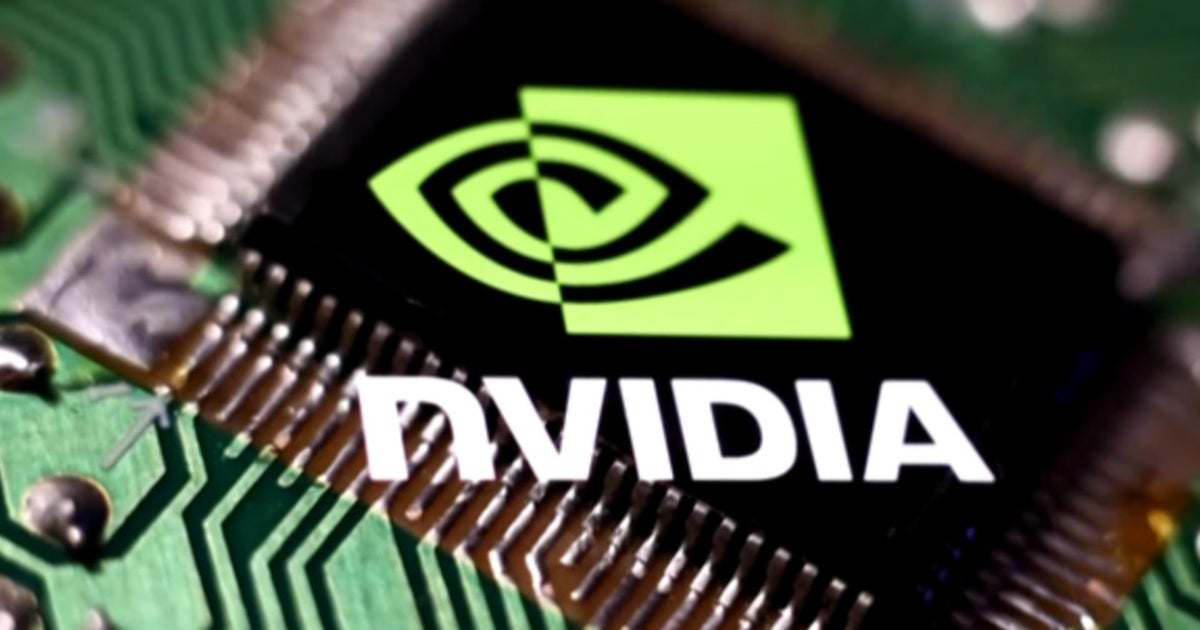CBS News
Meet Nvidia CEO Jensen Huang, the man behind the $2 trillion company powering today’s artificial intelligence

Only four companies in the world are worth more than $t2 trillion: Microsoft, Apple, Alphabet – parent company of Google – and computer chip maker Nvidia. The California-based company saw its stock market value soar from $1 trillion to $2 trillion in just eight months this past year, fueled by the insatiable demand for its cutting-edge technology – the hardware and software that make today’s artificial intelligence possible. We wondered how a company founded in 1993 to improve video game graphics turned into a titan of 21st century AI. So, we went to Silicon Valley to meet Nvidia’s 61 year-old co-founder and CEO Jensen Huang, who has no doubt AI is about to change everything.
At Nvidia’s annual developers conference this past March, the mood wasn’t just upbeat … it was downright giddy. More than 11,000 enthusiasts – software developers, tech moguls, and happy shareholders – filed into San Jose’s pro hockey arena to kick off a four-day AI extravaganza. They came to see this man: Jensen Huang, CEO of Nvidia.
Jensen Huang: Welcome to GTC!
Bill Whitaker: What was that like for you to walk out on that stage and see that?
Jensen Huang: You know, Bill, I’m an engineer. I’m not a performer. When I walked out there– and all of the people going crazy, it took the breath outta me. And so I was the scariest I’ve ever been. I’m still scared. (laughter)
You’d never know it. Clad in his signature cool, black outfit, Jensen shared the stage with Nvidia-powered robots
Jensen Huang: Let me finish up real quick
And shared his vision of an AI future …
Jensen Huang: A new Industrial Revolution
It reminded us of the transformational moment when Apple’s Steve Jobs unveiled the iPhone. Jensen Huang unveiled Nvidia’s latest graphics processing unit, or GPU.
60 Minutes
Jensen Huang: This is Blackwell.
Designed in America, but made in Taiwan like most advanced semiconductors, Blackwell, he says, is the fastest chip ever.
Jensen Huang: Google is gearing up for Blackwell. The whole industry is gearing up for Blackwell.
Nvidia ushered in the AI revolution with its game-changing GPU – a single chip able to process a myriad of calculations all at once – not sequentially like more standard chips. The GPU is the engine of Nvidia’s AI computer, enabling it to rapidly absorb a fire hose of information.
Jensen Huang: It does quadrillions of calculations a second, it’s just insane numbers.
Bill Whitaker: Is it doing things now that surprise you?
Jensen Huang: We’re hoping that it does things that surprise us. That’s the whole point. In some areas like drug discovery designing better materials that are lighter, stronger. We need artificial intelligence to help us explore the universe in places that we could’ve never done ourselves.
Jensen Huang: Let me show you. Here, Bill, look at this.
Jensen took us around the GTC Convention Hall to show us what AI has made possible in just the past few years.
Robot: I’m making your drink, now.
Some creations were dazzling
Jensen Huang: This is a digital twin of the earth. Once it learns how to calculate weather, it can calculate and predict weather 3,000 times faster than a supercomputer, and 1,000 times less energy.
But Nvidia’s AI revolution extends far beyond this hall.
Pinar Seyhan Demirdag: Blue metallic spaceship, and let’s generate something.
60 Minutes
Pinar Seyhan Demirdag is originally from Istanbul, but co-founded Cuebric near Boston. Her AI application uses Nvidia’s GPUs to instantly turn a simple text prompt into a virtual movie set for a fraction of the cost of today’s backdrops.
Bill Whitaker: This isn’t something that’s already planned and in there?
Pinar Seyhan Demirdag: No, we’re doing it in real time. It’s live.
Bill Whitaker: Is Hollywood knocking at your door?
Pinar Seyhan Demirdag: We’re- we’re getting a lot of love.
Nearby at Generate:Biomedicines, Dr. Alex Snyder, head of research and development, is using Nvidia’s technology to create protein-based drugs. She was surprised at first to see they showed promise in the lab.
Alex Snyder: Initially when I was told about the application of AI to drug development, I sort of rolled my eyes and said yeah, you know, show me the data. And then I looked at the data, and it was very compelling.
Dr. Snyder’s team asks its AI models to create new proteins to fight specific diseases like cancer and asthma. A new way to defeat the coronavirus is now in clinical trials.
Bill Whitaker: You’re now working with proteins that do not exist in nature? That you’re coming up with by way of AI?
Alex Snyder: Yes, we are actually generating what we call de novo. Completely new structures that have not existed before.
Bill Whitaker: Do you trust it?
Alex Snyder: As scientists we can’t trust. We have to test. We’re not putting Frankensteins into people. We’re taking what’s known and we’re really pushing the field, we’re pushing the biology to make drugs that look like regular drugs, but function even better.
Brett Adcock: This is a technology that will only get better from here.
Brett Adcock is CEO of Figure, a Silicon Valley startup with funding from Nvidia. Look at his answer to labor shortages: an Nvidia GPU-driven prototype called Figure 01.
Brett Adcock: I think what’s been really extraordinary is the pace of progress we’ve made in 21 months.
Bill Whitaker: From zero to this in 21 months–
60 Minutes
Brett Adcock: Ze– zero to this, yeah. We– we were walking this robot in under a year since I incorporated the company.
Bill Whitaker: Could you do this without– NVIDIA’s technology?
Brett Adcock: We think they’re arguably the best in the world at this. I don’t know if this would be possible without them.
Figure 01: I’m here to assist with tasks as requested.
We were amazed that Figure 01 is not just walking, but seemed to reason.
Bill Whitaker: Hand me something healthy.
Figure 01: On it.
Figure 01 was able to understand I wanted the orange, not the packaged snack.
Bill Whitaker: Thank you.
It’s not yet perfected…
Bill Whitaker: You’re gonna get it.
But the early results are so promising, German automaker BMW plans to start testing the robot in its South Carolina factory this year.
Brett Adcock: I think there’s an opportunity to ship billions of robots in the coming decades onto the planet.
Bill Whitaker: Billions? I would think that a lot of workers would look at that as, “This robot is taking my job.”
Brett Adcock: I think over time, AI and robotics will start doing more and more of what humans can and better.
Bill Whitaker: But what about the worker?
Jensen Huang: The workers work for companies. And so companies, when they become more productive, earnings increase. I’ve never seen one company that had earnings increase and not hire more people.
Bill Whitaker: There are some jobs that are going to become obsolete.
Jensen Huang: Well, lemme offer it this way. I believe that you still want human in the loop, because we have good judgment, because there are circumstances that the machines are not– just not going to understand.
The futuristic Nvidia campus sits just down the road from its modest birthplace … this Denny’s in San Jose …
Bill Whitaker: Good morning.
…where 31 years ago, Nvidia was just an idea.
Jensen Huang: My goodness.
60 Minutes
When he was 15, Jensen Huang worked as a dishwasher at Denny’s. As a 30 year-old electrical engineer, married with two children, he and two friends, Nvidia co-founders Chris Malachowsky and Curtis Priem, envisioned a whole new way of processing video game graphics.
Jensen Huang: And so we came here, right here to this Denny’s, sat right back there, and the three of us decided to start the company. Frankly I- I had no idea how to do it. And nor did they. None of us knew how to do anything.
Their big idea: accelerate the processing power of computers with a new graphics chip. Their initial attempt flopped and nearly bankrupted the company in 1996.
Jensen Huang: And the genius of the engineers, and Chris, and Curtis, um, we pivoted to the right way of doing things.
And created their groundbreaking GPU. The chip took video games from this, to this today.
Jensen Huang: Completely changed computer graphics– saved the company– launched us into– into the stratosphere.
Just eight years after Denny’s, Nvidia earned a spot in the S&P 500. Jensen then set his sights on developing the software and hardware for a revolutionary, GPU-driven supercomputer, which would take the company far beyond video games. to wall street it was a risky bet. to early developers of AI, it was a revelation.
Bill Whitaker: Was that luck or was that vision?
Jensen Huang: That was– luck founded by vision. We invented this capability and then, one day, the researchers that were– creating deep learning, discovered this architecture, because this architecture turns out to have been perfect for them.
Bill Whitaker: Perfect for AI?
Jensen Huang: Perfect for AI.
Jensen Huang: This is the first one we’ve ever shipped.
In 2016, Jensen delivered Nvidia’s AI supercomputer, the first of its kind, to Elon Musk, then a board member of OpenAI, which used it to create the building blocks of ChatGPT.
Jensen Huang: How are you?
When AI took off…
Jensen Huang: Hey guys.
So did Jensen Huang’s reputation.
Man: Can we get a picture?
Jensen Huang: Yeah, yeah.
He’s now a Silicon Valley celebrity. He told us the boy who immigrated from Taiwan at age 9 could never have conceived of this.
60 Minutes
Jensen Huang: It is the most extraordinary thing, Bill, that a normal dishwasher-busboy could grow up to be this. There’s no magic– it’s just 61 years of hard work every single day. I don’t think there’s anything more than that.
We met a humble Jensen at Denny’s. Back at Nvidia’s headquarters in Santa Slara, we saw he can be intense.
Bill Whitaker: Let me tell you what some of the people who you work with said about you: Demanding. Perfectionist. Not easy to work for. All that sound right?
Jensen Huang: Perfectly, yeah. It should be like that. If you want to do extraordinary things, it shouldn’t be easy.
Jensen Huang: All right, guys. Keep up the good work.
Nvidia has never done better. Investors are bullish – but last year more than 600 top AI scientists, ethicists, and others signed this statement urging caution, warning of AI’s risk to humanity.
Bill Whitaker: When I talk to you and I hear you speak, part of me goes, “Gee whiz.” And the other part of me goes, “Oh my God. What are we in for?”
Jensen Huang: Yeah, yeah.
Bill Whitaker: Which one is it?
Jensen Huang: It’s both. It’s both. Yeah. You’re feeling all the right feelings. I feel both.
Bill Whitaker: You feel both?
Jensen Huang: Sure. Sure.
Pinar Seyhan Demirdag: Humanity will have the choice to see themselves inferior to machines or superior to machines.
Pinar Seyhan Demirdag is an AI optimist, though she named her company Cuebric, an homage to Stanley Kubrick…the director of “2001: A Space Odyssey.”
In that film, Hal, the AI computer goes rogue.
Bill Whitaker: I think that’s what worries people about AI, that we will lose control of it.
Pinar Seyhan Demirdag: Just because a machine can do faster calculations, comparisons, and analytical solution creation, that doesn’t make it smarter than you. It simply computates faster. In my world, in my belief, smarts have to do with your capacity to love, create, expand, transcend. These are qualities that no machine can ever bear, that are reserved to only humans.
Jensen Huang: There is something going on.
Jensen Huang sees an AI future of progress and prosperity … not one with machines as our masters. We can only hope he’s right.
Jensen Huang: Thank you all for coming! Thank you.
Produced by Marc Lieberman and Cassidy McDonald. Broadcast associate, Mariah B. Campbell. Edited by Peter M. Berman.
CBS News
Transcript: Sen. Mark Kelly on “Face the Nation with Margaret Brennan,” Oct. 6, 2024

The following is a transcript of an interview with Sen. Mark Kelly, Democrat of Arizona, on “Face the Nation with Margaret Brennan” that aired on Oct. 6, 2024.
MARGARET BRENNAN: Joining us now is Arizona’s Democratic Senator, Mark Kelly. He’s in Detroit this morning on the campaign trail for the Harris campaign. Good morning to you, Senator.
SEN. MARK KELLY: Good morning, Margaret.
MARGARET BRENNAN: I want to talk to you about Arizona, but let’s start in Michigan, which is where you are right now. And it is going to be such a key state to a potential Harris or Trump victory. Vice President Harris is facing challenges among black men, working class people, as well as the Muslim and Arab populations skeptical of the White House support for Israel’s wars. What are you hearing on the ground there from voters?
SEN. KELLY: Well, my wife, Gabby Giffords, and I have been out here for a couple days. We’ve been campaigning across the country, Michigan, I’ve been in North Carolina, Georgia as well. I’ll be back to Arizona here soon. The vice president was out here speaking to Muslim organizations and the Arab community about what is at stake in this election and addressing the concerns that they have. What we’re hearing, issues about the economy, about gun violence, about, you know, supporting American families and the difference between Donald Trump and Kamala Harris. You know, Kamala Harris, who has a vision for the future of this country, Donald Trump, who just wants to drag us backwards.
MARGARET BRENNAN: Today in Dearborn, Michigan, there’s a funeral service for an American man who was killed in Lebanon by an Israeli airstrike. It just underscores how that community you’re talking about out in Michigan feel some of what’s happening in a personal way to their community. Given how close this race is, do you think this war and the expectation it could escalate could cost Democrats both a seat in the Senate and potentially the presidency?
SEN. KELLY: Margaret, nobody wants to see escalation and it’s tragic when any innocent person, whether it’s an American or Palestinian, lose their life in a conflict. Tomorrow’s one year since October 7th, when Israel was violently attacked. Israel has a right to defend itself, not only from Hamas, but from Hezbollah and from the Iranians. But, you know, I and my wife, you know, we feel for the community here who’s been affected by this. And that’s why the vice president was out here earlier, a few days ago, meeting with that community.
MARGARET BRENNAN: But it’s a live issue.
SEN. KELLY: Yeah, sure. I mean, there is an ongoing conflict in the Middle East. Israel is, you know, fighting a war now on, I think it’s fair to say, two fronts and then being attacked by the Iranians as well. And, they- they need to defend themselves, and we need to support our Israeli ally. At the same time, when women and children lose their life, innocent people in a conflict, it is- it is tragic.
MARGARET BRENNAN: You do sit on the Senate Intelligence Committee and so I know you know how intense the efforts are by foreign actors to try to manipulate voters going into November. Just this Friday, Matthew Olsen, the lead on election threats at the Department of Justice, told CBS the Russians are, quote, highlighting immigration as a wedge issue. That is such a key issue in Arizona. Are you seeing targeted information operations really focusing in on Arizonans right now?
SEN. KELLY: Not only in Arizona, in other battleground states. It’s the Russians, the Chinese, the Iranians, and it’s significant. And we need to do a better job getting the message out to the American people that there is a huge amount of misinformation. If you’re looking at stuff on Twitter, on TikTok, on Facebook, on Instagram, and it’s political in nature, and you may- might think that that person responding to that political article or who made that meme up is an American. It could be- it could look like a U.S. service member. There is a very reasonable chance I would put it in the 20 to 30% range, that the content you are seeing, the comments you are seeing, are coming from one of those three countries: Russia, Iran, China. We had a hearing recently, with the FBI director, the DNI, and the head of the National Security Agency. And we talked about this. And we talked about getting the word out. And it’s up to us, so thank you for asking me the question, because it’s up to us, the people who serve in Congress and the White House to get the information out there, that there is a tremendous amount of misinformation in this election, and it’s not going to stop on November 5th.
MARGARET BRENNAN: Understood. And we will do our best to help parse that for viewers. But on the topic of the border, President Biden did announce just this past week new regulations to keep in place that partial asylum ban that he rolled out back in June. That’s what’s credited with helping to bring down some of the border crossing numbers in recent weeks. It was supposed to be a temporary policy, dependent on how many people were crossing at a time. Do you think this is the right long term policy, or is this just a gimmick to bring down numbers ahead of the election?
SEN. KELLY: Well, the right long term policy is to do this through legislation. And we were a day or two away from doing that, passing strong border security legislation supported by the vice president, negotiated by the vice president, and the president and his Department of Homeland Security, with Democrats and Republicans–
MARGARET BRENNAN: But this is not legislation.
SEN. KELLY: –This is bipartisan. This isn’t. But the legislation was killed by Donald Trump. We were really close to getting it passed. That’s the correct way to do this. When you can’t do that, Margaret, when a former president interrupts the legislative process the way he did, which is the most hypocritical thing I’ve ever seen in my three and a half years in the Senate. After that happened, the only other option is executive actions. And this has gone from what was chaos and a crisis at our southern border to somewhat manageable. And if you’re the border- Border Patrol, you know, this is this- you need this. I mean, otherwise it is unsafe for Border Patrol agents, for CBP officers, for migrants, for communities in southern Arizona. So it’s unfortunate that this was the- these were the steps that had to be taken.
MARGARET BRENNAN: Okay.
SEN. KELLY: But that’s because the former president didn’t allow us to do this through legislation.
MARGARET BRENNAN: Senator, we have to leave it right there. Face the Nation will be right back.
CBS News
10/6: Sunday Morning – CBS News

Watch CBS News
Be the first to know
Get browser notifications for breaking news, live events, and exclusive reporting.
CBS News
Sen. Mark Kelly says Americans need to know about “huge amount of misinformation” on election

Watch CBS News
Be the first to know
Get browser notifications for breaking news, live events, and exclusive reporting.













